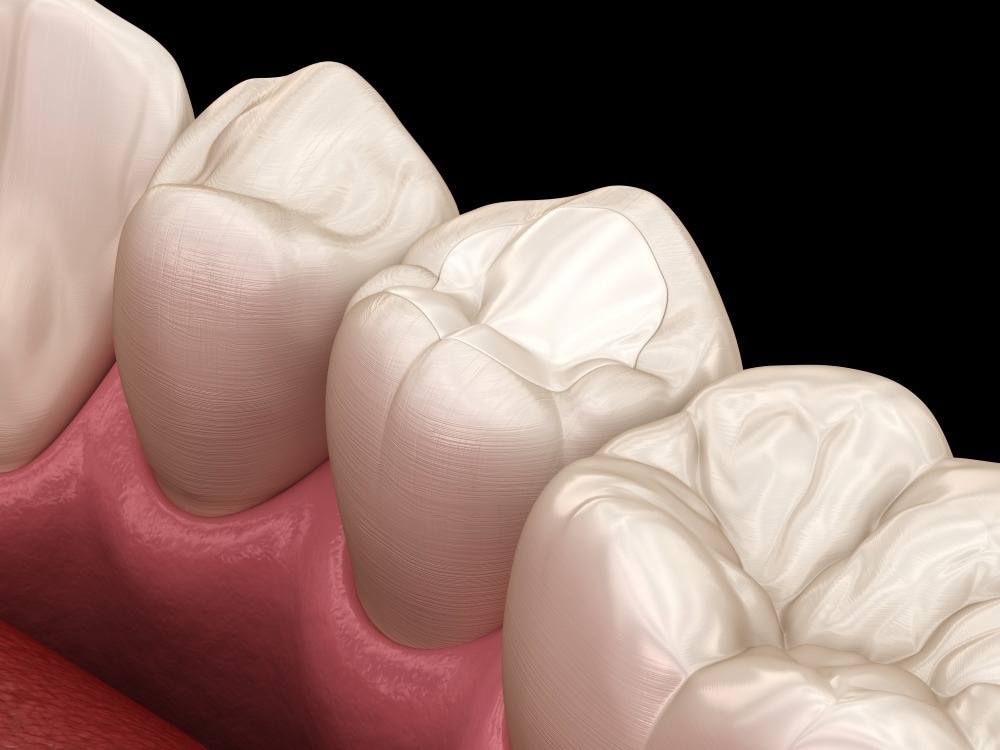Methacrylate-based materials are often used in bone cement and dental resins. However, they have high failure rates as they undergo damage within ten years, impacting the quality of patient’s life and increasing healthcare costs.

Study: Biocompatible Nanocapsules for Self-Healing Dental Resins and Bone Cements. Image Credit: Alex Mit/Shutterstock.com
Although replacing methacrylate-based materials with self-healing resins and bone cement could increase lifespan, reduce costs, and enhance patient outcomes, the practical applicability of these materials is limited due to their low efficacy and toxicity. An article published in the journal ACS Omega addressed this issue by developing a dual nanocapsule-based self-healing system.
Two polyurethane (PU) shell-based nanocapsules were synthesized: an initiator capsule containing benzoyl peroxide and butylated hydroxytoluene and a monomer capsule containing triethylene glycol dimethacrylate.
Resins with these nanocapsules were tested under tension until failure, followed by assembling the fractured surfaces. 33% of samples showed self-healing behavior and could be reloaded for testing under tension. The capsules and their components were biocompatible with Caco-2 cell lines, suggesting in vivo tolerance of the prepared nanocapsules.
Nanocapsules as Self-Healing Materials
Self-healing materials, when damaged through thermal, mechanical, and ballistic effects can heal and restore materials to their original properties. Few materials intrinsically possess this self-healing ability, which is a valuable characteristic in designing systems since it effectively expands the lifetime use of the product and has desirable economic and human safety attributes.
These self-healing materials could be useful in methacrylate-based systems, including dental resins and bone cement. Aseptic loosening of bone cement by forming cracks may trigger inflammation and bone resorption, requiring expensive surgical intervention. Although modern dental resins prevent any effects on the environment and health with mercury, their poor durability causing implant damage within ten years, has increased the cost of dental care.
Nanocapsules are hollow sphere structures with submicrometer dimensions. Such nanocapsules can accommodate large quantities of guest molecules within their empty core domain. These materials could be helpful in applications in the fields of biological chemistry, synthesis, and catalysis.
Polymeric nanocapsules with a multitude of applications have already been proposed, such as confined reaction vessels, drug carriers, protective shells for cells or enzymes, transfection vectors in gene therapy, carrier systems in heterogeneous catalysis, dye dispersants, or as materials for removal of contaminated waste.
Methacrylate-based nanocapsules are easy to implement for self-healing properties in both dental resins and bone cement due to their filler particles that enhance the material’s mechanical properties. Initially, the nanocapsules simply act as an additional filler. However, when a crack propagates through the material, it breaks and releases components into the crack through capillary action that polymerizes later to heal the matrix.
Biocompatible Nanocapsules with Self-Healing Capacity
Nanocapsules were hypothesized to undergo a robust self-healing process with less impact on the mechanical properties than larger particles. Thus, the present work aimed to investigate single and dual nanocapsule systems based on PU and nontoxic components.
The impact of the prepared single and dual nanocapsules on the self-healing process of methacrylate resins was determined by synthesizing PU nanocapsules, which encapsulate either the initiator or monomer. Furthermore, the mechanical testing and biocompatibility analysis determined the system’s feasibility as a self-healing additive for bone cement and dental resins.
The monomer used here was TEGDMA, with a long shelf-life and quick polymerization capability. The healing liquid was expected to have low viscosity to flow through cracks of resin and fill it. Hence, TEGDMA was previously used as a dental monomer.
Here, using butylated hydroxytoluene (BHT) along with benzyl peroxide (BPO) prevented the formation of free radicals before their release from the capsule. Thus, the initiator component based on BPO and BHT increased the stability of the dual-capsule-based self-healing system.
The fracturing of nanocapsules was an important finding of the present work since their rupture was the basis for the self-healing process. While a too-thick shell did not allow the capsule to rupture, a too-thin shell resulted in fragile nanocapsules.
Conclusion
Overall, PU nanocapsule encapsulating TEGDMA monomer was embedded into an epoxy resin. These embedded resins were compared with their blank counterparts to determine the effects of monomer nanocapsules on the resin’s mechanical properties.
Comparing the elastic modulus, yield stress, ultimate tensile stress, and strain to fracture indicated that the resin without monomer capsules was stronger than the resin with monomer capsules. The monomer nanocapsules cracked during the resin fracture, proving the self-healing effect of the nanocapsules in resins.
Moreover, premature cracking of resins in the gastrointestinal tract did not cause any detrimental effects on the patient, suggesting the biocompatibility of the developed self-healing system. Furthermore, a small degree of self-healing capacity was observed in the resins with monomer nanocapsules, unencapsulated BPO, and the resins with monomer nanocapsules, and initiator capsules.
Reference
Menikheim, S et al. (2022). Biocompatible Nanocapsules for Self-Healing Dental Resins and Bone Cements. ACS Omega. https://pubs.acs.org/doi/10.1021/acsomega.2c02080
Disclaimer: The views expressed here are those of the author expressed in their private capacity and do not necessarily represent the views of AZoM.com Limited T/A AZoNetwork the owner and operator of this website. This disclaimer forms part of the Terms and conditions of use of this website.